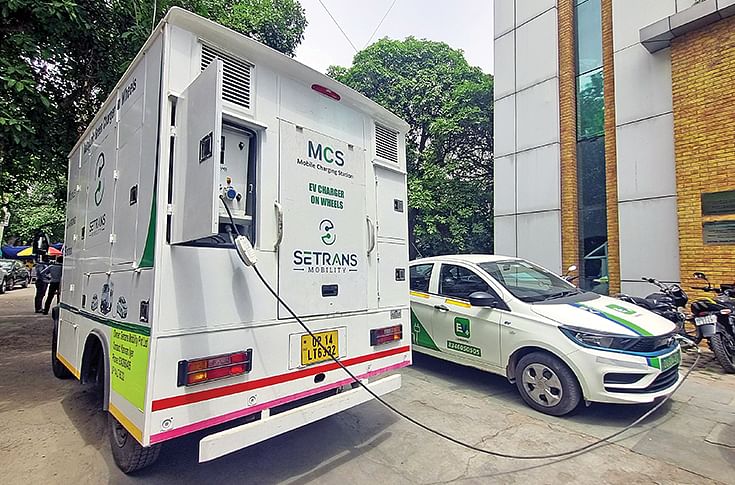Setrans Mobility Booster Charging top-up 25% EV range in 15 minutes
Two enterprising tech-savvy entrepreneurs Rana Roshan Singh and Vivek Ummat of Noida, Uttar Pradesh-based start-up Setrans Mobility Private Limited have together developed proprietary doorstep mobile gas-to-power charging solutions.
Run us through the business model of Setrans Mobility and the services are you offering.
Rana Roshan Singh: We describe our operations as an opportunity charging solution for EV charging. We offer two services — the first one being the Charging as a Service (CaaS), that’s a subscription-based EV charging package that offers sustainable, off-grid, on-demand, to the doorstep EV charging solutions for the EV owner. Here, the EV owner pays a requirement-based fee for a fixed term usage.
The second one is Battery as a Service (BaaS), that’s a subscription-based Battery Swapping package for EV charging. BaaS uses a small portable power bank to charge the EV at the owner's convenience.
EV powertrains have various voltage requirements. How’s that factored in?
Rana Roshan Singh: We are offering grid-free charging solutions on demand through its proprietary smart app technology our mobile charging stations MCS. Our mobile vehicles are tailored to offer options of BS AC-001, Type-2 and CCS2. Both AC and DC EVSE comply with the technical standards of IS-17017-Parts 21 and 22, with IS-17017- Part-1 and IS-17017- Part-2 complying connectors to provide power to EVs with 48/60/72 volt systems.
What’s the utilisation rate between FCS and MCS?
Rana Roshan Singh: An average FCS (Fix Charging Station) utilisation is estimated to be lower than 5%. But the on demand MCS utilisation is estimated to be over 60% due to convenience and substitution of instant power.
How are compatibility issues taken care of during the EV battery charging process?
Rana Roshan Singh: Setrans Mobility Mobile charging stations are cloud connected. The mobile station is capable of working with or without grid power and the charging services can be used anywhere by the customer via booking through an app.
This type of MCS design and developed by Setrans Mobility is a unique and patented innovative mobile charging solution. Unlike other MCS or FCS (Fixed Charging Stations), it does not require grid power and generates its own power on board through its unique Setrans Autogenic Power Systems by converting gas into power Setrans provides EV charging services through a vehicle mounted charger. It can also be used as stationery with a quick connect system, making it a hybrid of MCS & FCS to serve as fixed station as well as a mobile station.
How can an EV user avail mobile charging solutions?
Vivek Ummat: The mobile setup allows electric vehicle owners to book a charging session wherever they are located and make payments via a mobile app. We can ensure a typical 25% energy top up of EVs like cars, cabs and cargo vehicles.
Is there a limit to the type of EVs that can benefit from Setrans Mobility’s MCS?
Vivek Ummat: Virtually by anyone — owners/users of EV in private business or government sector as well as by individuals for charging their electric vehicles in a hassle-free manner. EV charging companies can also benefit as MCS can be used as stationary charging stations through a quick connect feature on availability of a grid.
 Doorstep EV charging services is a more convenient way to charge EVs, and is an alternative to costly and challenging installations of traditional in-ground charging stations.
Doorstep EV charging services is a more convenient way to charge EVs, and is an alternative to costly and challenging installations of traditional in-ground charging stations.
How clean is the energy generated in your system?
Vivek Ummat: It primarily uses compressed biogas (CBG) or alternatively, CNG in its generating systems which are proven to have no carbon footprint or very low carbon footprint when compared to conventional fuel like diesel or thermal power grid.
What are the limitations of the MCS as a system?
Vivek Ummat: MCS, as a technology, possesses immense potential and adaptations for mitigating challenges. However, MCS are available in four models, each model will have limitations of maximum power -- Multiport MCS capability of 50KW distributed power but CCS2 limited to 30KW Max. However, Uniport MCS capability of 10KW and CCS2 possibilities could be 30KW. Since the company is getting ready with combinations of solutions but operations will be limited to zones till the success for Pan India is achieved using this technology through associates and partners.
RELATED ARTICLES
INTERVIEW: "EV Demand is Rebounding both in India and Around the Globe" - JLR's Rajan Amba
Jaguar Land Rover India MD Rajan Amba discusses the India–UK FTA, the company’s manufacturing plans, the upcoming Panapa...
TVS Celebrates 20 Years of Apache, Eyes Premium and Global Push
Marking two decades of its flagship performance brand, TVS Motor unveiled special anniversary editions on Saturday while...
Q&A: Mahindra's Nalinikanth Gollagunta on Upcoming Festive Season, 'Bold' Design Choices
Automotive Division CEO Nalinikanth Gollagunta says mid-teens growth is achievable with Roxx ramp-up, BEVs, and a resil...






 22 Apr 2024
22 Apr 2024
 14312 Views
14312 Views





 Prerna Lidhoo
Prerna Lidhoo


 Darshan Nakhwa
Darshan Nakhwa


